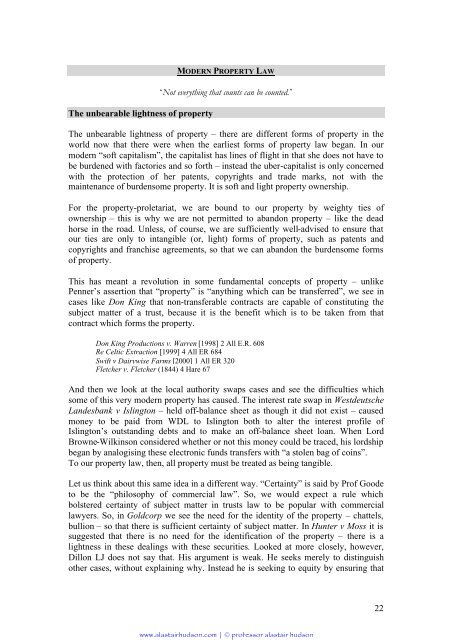England's dreaming equity, trust and conscience - alastairhudson.com
England's dreaming equity, trust and conscience - alastairhudson.com
England's dreaming equity, trust and conscience - alastairhudson.com
You also want an ePaper? Increase the reach of your titles
YUMPU automatically turns print PDFs into web optimized ePapers that Google loves.
The unbearable lightness of propertyMODERN PROPERTY LAW‘Not everything that counts can be counted.’The unbearable lightness of property – there are different forms of property in theworld now that there were when the earliest forms of property law began. In ourmodern “soft capitalism”, the capitalist has lines of flight in that she does not have tobe burdened with factories <strong>and</strong> so forth – instead the uber-capitalist is only concernedwith the protection of her patents, copyrights <strong>and</strong> trade marks, not with themaintenance of burdensome property. It is soft <strong>and</strong> light property ownership.For the property-proletariat, we are bound to our property by weighty ties ofownership – this is why we are not permitted to ab<strong>and</strong>on property – like the deadhorse in the road. Unless, of course, we are sufficiently well-advised to ensure thatour ties are only to intangible (or, light) forms of property, such as patents <strong>and</strong>copyrights <strong>and</strong> franchise agreements, so that we can ab<strong>and</strong>on the burdensome formsof property.This has meant a revolution in some fundamental concepts of property – unlikePenner’s assertion that “property” is “anything which can be transferred”, we see incases like Don King that non-transferable contracts are capable of constituting thesubject matter of a <strong>trust</strong>, because it is the benefit which is to be taken from thatcontract which forms the property.Don King Productions v. Warren [1998] 2 All E.R. 608Re Celtic Extraction [1999] 4 All ER 684Swift v Dairywise Farms [2000] 1 All ER 320Fletcher v. Fletcher (1844) 4 Hare 67And then we look at the local authority swaps cases <strong>and</strong> see the difficulties whichsome of this very modern property has caused. The interest rate swap in WestdeutscheL<strong>and</strong>esbank v Islington – held off-balance sheet as though it did not exist – causedmoney to be paid from WDL to Islington both to alter the interest profile ofIslington’s outst<strong>and</strong>ing debts <strong>and</strong> to make an off-balance sheet loan. When LordBrowne-Wilkinson considered whether or not this money could be traced, his lordshipbegan by analogising these electronic funds transfers with “a stolen bag of coins”.To our property law, then, all property must be treated as being tangible.Let us think about this same idea in a different way. “Certainty” is said by Prof Goodeto be the “philosophy of <strong>com</strong>mercial law”. So, we would expect a rule whichbolstered certainty of subject matter in <strong>trust</strong>s law to be popular with <strong>com</strong>merciallawyers. So, in Goldcorp we see the need for the identity of the property – chattels,bullion – so that there is sufficient certainty of subject matter. In Hunter v Moss it issuggested that there is no need for the identification of the property – there is alightness in these dealings with these securities. Looked at more closely, however,Dillon LJ does not say that. His argument is weak. He seeks merely to distinguishother cases, without explaining why. Instead he is seeking to <strong>equity</strong> by ensuring that22www.<strong>alastairhudson</strong>.<strong>com</strong> | © professor alastair hudson













